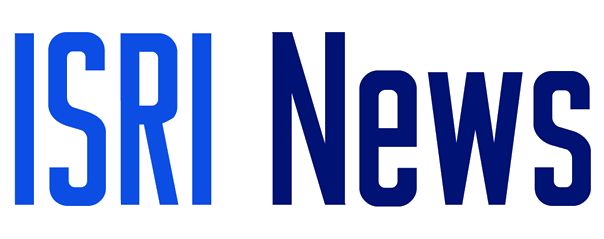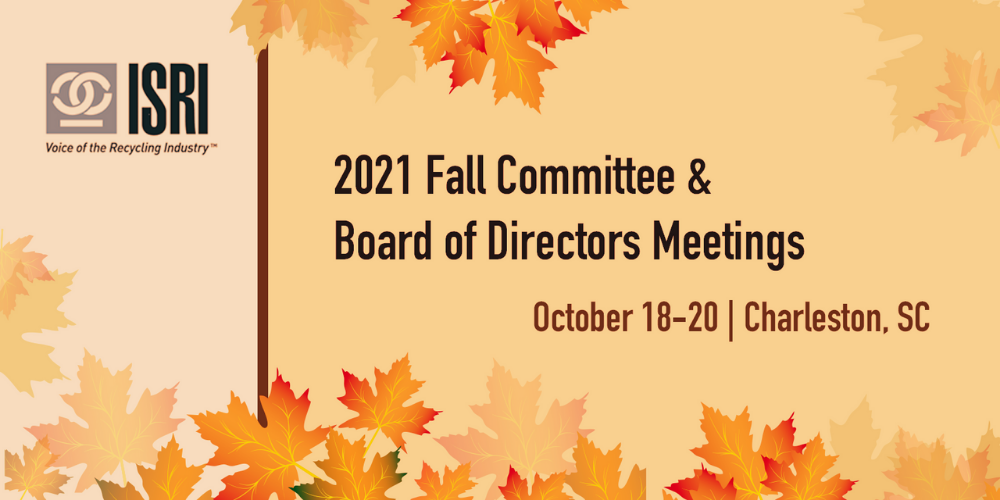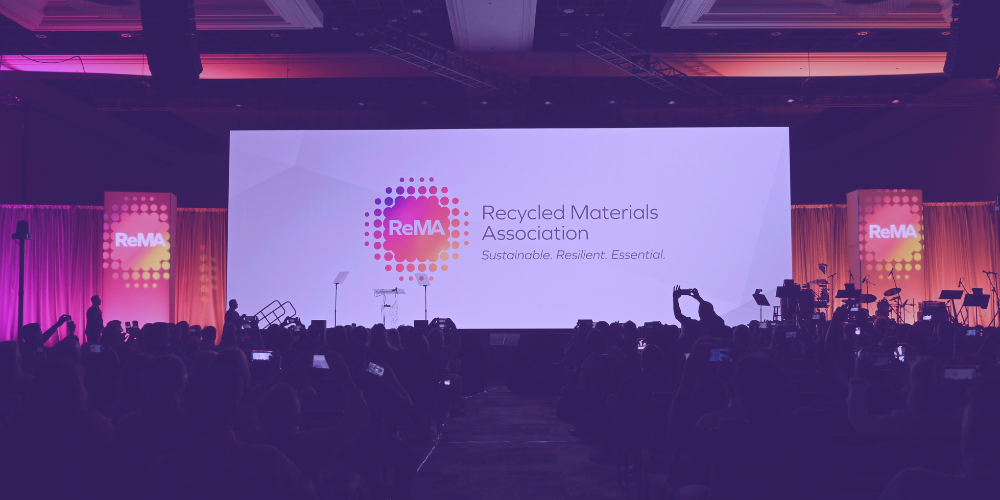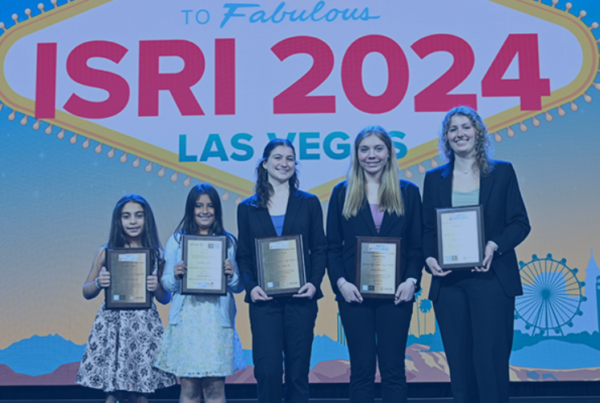The 2021 ISRI Fall Meetings began Monday, Oct. 18, in Charleston, S.C. The meetings run through Wednesday, Oct. 20. Most of the meetings are open and free for all ISRI members to attend. Virtual meetings were held the week of Oct. 10-16, including the Young Executives Council, the Equipment and Service Providers Council, and the Shredders Committee.
ISRI leadership has a positive outlook for fulfilling the association’s mission of promoting safe, economically sustainable, and environmentally responsible recycling through networking, advocacy, and education. Both membership and non‐dues income projections for 2022 are based on growth in membership retention and recruitment during the COVID-19 pandemic, as well as solid performance in online and in‐person opportunities planned in the coming year.
“After the pandemic challenges of the last year,” ISRI President Robin Wiener states, “ISRI redesigned and reimagined our budget process for 2022 to generate results that will improve performance for our members across the board. The finance team worked with ISRI management and departments, using key performance indicators, trends and reinventing spending from a zero base to determine the drivers necessary to develop a budget that is in line with our mission and strategic priorities.”
Five overarching priorities will guide ISRI’s work in 2022: deficit reduction; digital transformation; reinforcing OneISRI; industry sustainability; and association infrastructure.
Continued Movement to Reducing ISRI’s Deficit
Strategic reserve savings made by ISRI during surplus years, along with strong stock market returns, resulted in a sizeable investment fund to help support ISRI’s operations during challenging times like the years affected by the COVID-19 global pandemic, as well as during “normal” times, with reasonable allowable contributions spelled out in ISRI’s Investment Policy. But in the long term, the association needs to move toward a balanced budget without reliance on our reserves. Among the steps being taken:
- Membership income growth: ISRI estimates that goals set out under the “Road to 1600” campaign will be realized during the 2023 budget.
- Managing mergers and acquisitions (M&A) effects on association income: ISRI plans to convene a small working group of representative members to evaluate this issue.
- Renegotiation of ISRI’s headquarters lease: ISRI is collaborating with advisers to “right-size” the office footprint to reflect lessons learned during the pandemic.
- Growing openings for greater member service and potential income through grants:
- ISRI has been exploring grant money that would allow us to develop a workforce development program, including supporting industry internships.
- Due to a Commerce Department grant that covers one-third of the cost, the ISRI Spec Working Group will at last be able to create an online, accessible version of our Specifications.
-
- Once the Recycling Education and Research Foundation has in place its new staff and starts growing, ISRI plans to move ISRI’s youth outreach efforts to the foundation. ISRI is also helping to strengthen RERF activities so future grant applications can go through the foundation, increasing the likelihood ISRI will get those grants.
- Growth in non-dues income: ISRI’s marketing team will continue its successful approach of holistic sales of engagement prospects for companies wanting exposure to member audiences.
- Reducing expenses and maximizing outside-vendor contracts.
Continued Association‐Wide Digital Transformation.
The past two years have seen significant change and innovation when it comes to business technologies, including in how information, data and services are delivered and consumed. ISRI’s ability to successfully deliver the programs members want and deserve require making further investments in our IT infrastructure.
- Cybersecurity: ISRI will be adding best‐practice cybersecurity management tools to protect both user endpoints and core ISRI systems from threats.
- Database and related expenses: NetForum, ISRI’s membership database, will undergo significant upgrades. NetForum interacts with key areas of ISRI digital technology, including the website content management system, our sales and marketing platforms, e‐newsletters, registration, and other digital tools.
- Website and digital content: As the “online front door” of the association, ISRI.org will see areas of transformation in 2022, including:
- Creation of new multimedia content that improves storytelling and engages online audiences.
- Upgrading members‐only areas, including the online Membership Directory, membership application and payment systems, ISRI event registration, and a new ISRI Chapter Resources Portal.
- Education and training content developed and available via the newly launched learning management system which connects through ISRI.org.
OneISRI
Recyclers, regardless of commodity or geographical location, are all One. ISRI will continue to look for ways to move the association closer to our ideal. The 2022 budget includes related activities and expenses:
- In addition to creating an online chapter services portal, ISRI will hire a bookkeeper to support chapter needs and improve financial tracking, reporting, and audit compliance.
- To increase ISRI’s representation of plastics, ISRI will create a new State of Plastics report, which will supply much‐needed data and information, while asserting ISRI’s presence in the plastics marketplace.
- To increase engagement and membership growth in Information Technology Asset Disposition, ISRI will add focus on related activities, including educational workshops and hosting a reception at the 2022 ITAD Summit.
- During 2022, ISRI expects to spend significant resources—funded out of reserves rather than the operating budget—to advocate and support shredder operators on matters related to volatile organic emissions under the Clean Air Act.
- Our advocacy efforts will continue to support our members across all commodities on the state, federal, and international levels.
- The association continues to support ISRI chapters during ongoing discussions about mergers and the movement towards regionalization.
Advance the Sustainability of the Recycling Industry
Pursuing ISRI’s advocacy agenda strengthens awareness of recycling’s roots in sustainability (safety, environmental compliance, community engagement, workforce development and diversity, and cybersecurity), and focuses on the essential role of recycling as the first link in the manufacturing supply chain. Public policy actions around climate change, local community activism and Environmental Justice are arising at local, state, and national levels, while workplace shortages are continuing, making it more challenging for members to grow—and even sustain—operations. This requires that ISRI:
- Continue to aggressively protect and promote members’ interests through federal advocacy, global trade policy, and active involvement in organizations for state legislators and administrators.
- Implement a cohesive sustainability program that helps articulate and support member company sustainability efforts and credibility, while maximizing the influence and effectiveness of programs such as the Recyclability Protocol (fiber‐based material and other commodities in the future), ISRI’s Design for Recycling™, and growth and engagement of ISRI’s growing Brands Council.
- Define and supply support for community relations and engagement, including workforce development, youth outreach programs, and diversity, equity, and inclusion efforts to highlight ISRI members’ history of being vital to their communities.
- Rebrand ISRI to better define our industry as a critical element of the manufacturing economy and environmental stewardship while further elevating the organization’s profile and credibility with key stakeholders.
- Continue to exert leadership and support for member companies and their employees in the areas of health, safety and environmental responsibility through education, training, and environmental compliance.
Maintain a Strong and Effective Association Infrastructure.
To be successful in 2022 will require a strong and effective infrastructure to support, guide and implement our work. That infrastructure is composed of two important parts: ISRI’s governance system—a core group of approximately 75 volunteer leaders from member companies—and the ISRI staff. Keeping this infrastructure in place and working effectively will require:
- Stable and strong staffing.
- Effective and clear governance.
ISRI’s Finance Committee will formally review the 2022 proposed budget from 10:30 a.m. to noon on Wednesday, Oct. 20, during the annual Fall Meetings. The Board of Directors will vote on the budget during its noon to 2:00 p.m. business meeting on the same day.













